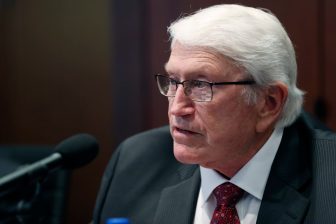
Incumbent Republican U.S. Rep. Steven Palazzo faces challenger Jackson County Sheriff Mike Ezell in Tuesday’s runoff for the GOP primary for the 4th District House seat, serving South Mississippi.
Palazzo, facing a crowded field of Republican challengers in the midterm primary, received about 32% of the vote; Ezell about 25%, forcing a runoff.
The two candidates spoke with Mississippi Today ahead of the runoff and a scheduled Friday debate on Coast television station WLOX.
Here is some background on the candidates, what they believe the top issues are and what differentiates them from one another.
The candidates
Ezell, who grew up in Pascagoula, is a 42-year veteran law enforcement officer in South Mississippi.
He started his career with the Pascagoula Police Department, working his way from jailer to chief of detectives, then served as chief of police for the city of Ocean Springs. He was elected sheriff of Jackson County, a post he has held since 2014.
Ezell has a degree in criminal justice from the University of Southern Mississippi and is a graduate of the FBI National Academy.
Palazzo, a Coast native, is a certified public accountant who ran his own business before taking his current office. He is a former state legislator, and has held the 4th District U.S. House seat since 2011.
Palazzo is a Marine Corps veteran and serves in the Mississippi National Guard.
Voters’ issues
Both candidates said inflation — particularly soaring gasoline prices — is the top issue they hear from 4th District residents as they campaign.
“The cost of energy is off the charts,” Palazzo said. “It was to be expected — President Biden when he was on his campaign said we would end our reliance on fossil fuels. Well, guess what? Now we have $5 a gallon gas. He cancelled Keystone pipeline on day one, killing hundreds of thousands of jobs, and many of those were in Mississippi, where we have pipe manufacturers.”
Ezell said he hears from constituents: “Gas prices, grocery prices, not having groceries in some stores. I’ve talked with some of our trucker friends and they said the fuel prices are killing us, making it hard to get our goods to the stores. People are very upset about this.”
Palazzo said illegal immigration, with attendant human trafficking and drug smuggling is another major issue for South Mississippi.
Ezell said high taxes and overregulation are also major issues.
Policies and proposals
Both candidates said they would push for deregulation, particularly on the energy sector.
Ezell said he would work to get fertilizer and other costs down for Mississippi farmers “so they can make a profit.”
“There are so many regulations out there right now,” Ezell said. “… We need to work with like-minded conservative people in Congress to get some policies in place to make life better for people, like getting grocery prices down … We need to see about cutting the gas tax, for the truckers who get the goods to the stores … We’ve just got to remove some of these regulations so that we can help people earn a living.”
Palazzo said: “As someone who’s worked offshore, I know the importance of American energy — drill here, drill now. We need to unleash American energy resources and get America back to being energy independent, and I think we can do that.”
Palazzo said he would also push to re-start plans to build a U.S. southern border wall and increase military spending, and protect tax cuts and jobs legislation passed in 2017.
Candidates list accomplishments
Palazzo said his accomplishments as a congressman include, “I was able to secure $1.4 billion for the border as the homeland security negotiator on the Appropriations Committee in 2019, and we were building the wall two years ago and securing America.”
“With the ships we build at Ingalls (shipyard) we’ve been able to secure $26 billion for 26 different ships in 10 years, and that is so vital to our national security, but also to our quality of life here, because of the dependence we have on those jobs created locally,” Palazzo said. He said he has also worked to keep federal flood insurance affordable for homeowners on the Gulf Coast and worked to support the state’s military installations, including for upgrades at Camp Shelby near Hattiesburg to expand training.
“The number one driver of the economy in South Mississippi is federal spending,” Palazzo said. “We have to admit that to ourselves, but it’s good federal spending — national security, NASA programs, NOAA to help predict storms — and every bit of that goes through my committee where I sit on Appropriations.”
Ezell said: “Some of my greatest accomplishments are being a husband and a father and a grandfather … I started working in the jail, and worked my way all the way up to chief of detectives at Pascagoula. During that time, I was a competitive shooter, and got to travel all around the southeastern part of the country to compete and shoot and learned a lot of techniques from other officers. I also graduated from the FBI’s national academy, where I excelled in all fields of training and received an award for physical fitness and attention to duty. I am also proud of that. During my time at the Pascagoula Police Department, I went to night school at USM and got a degree in criminal justice. That was a big thing for me. I was only the third person in my family to get a college degree.”
Ezell said that as sheriff, Jackson County was the first in the state to open its own crime lab, to avoid backlog problems faced by the state lab and “to save taxpayers money and help all the surrounding agencies in our county have a crime lab.” Ezell said under his tenure his agency has also recently opened its own shooting range and training facility.
“When I first took over as sheriff, the former sheriff had been indicted and removed, and all the police chiefs came to me and said, ‘Mike, help us rehabilitate and get this (narcotics) task force back together,’ which we have done and now have a highly respected organization,” Ezell said. “We have our own budget, and don’t have to depend on seizures or anything like that for funding.”
What differentiates them?
Ezell said one thing that differentiates him from Palazzo is, “I will be available. You won’t have to look for me.”
Palazzo has for years faced criticism for not being very visible or accessible in his district.
“What I’ve heard so many times around this district is we don’t know where (Palazzo) is at,” Ezell said. “Where is our representative? We don’t know where he’s at, we can’t talk with him, he won’t call us back. I will be available. I will be in the district and I will return your phone calls … General rule 101 with the sheriff’s office is if you call, somebody better call you back and if not, I’m going to be asking you why did you not call that person back. That’s just a common courtesy, be it a sheriff or police officer or state representative or congressman.”
Palazzo said his experience and seniority in Congress, and relationships he’s built over years are needed for the 4th District.
“Most importantly, I have a proven, conservative voting record,” Palazzo said. “My opponent has no record where he has ever cast a vote on issues that matter most for South Mississippians, whether it’s pro-life, whether it’s pro gun, pro military or pro business. For 12 years I’ve been serving South Mississippi and I have a proven record of delivering for them on all those issues.
“… Seniority is important in the military and it’s important in Congress,” Palazzo said. “That’s how you get on the key committees and get key assignments.”
He said that should Republicans retake the House this midterm, he would be in line to be the chairman of the Homeland Security subcommittee of Appropriations where he can push for building a border wall.
Recently, all other Republican challengers in the first primary vote threw their support behind Ezell. U.S. House Republican Whip Steve Scalise of Louisiana in a trip to South Mississippi endorsed Palazzo.
The two candidates have agreed to a televised debate, scheduled for 7 p.m. Friday on WLOX-TV on the Coast.
“I’ve been to multiple debates, Steven Palazzo has not been to any of them,” Ezell said of this election cycle.
Palazzo said: “I think it’s important for voters in South Mississippi to see the contrast.”
The winner of the June 28 GOP runoff will face Democratic former longtime Hattiesburg Mayor Johnny DuPree and Libertarian Alden Patrick Johnson in the Nov. 8 general election.
The post Videos: Where do Ezell, Palazzo stand on the issues? appeared first on Mississippi Today.






















